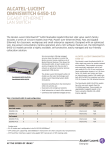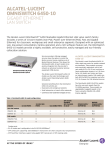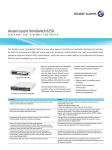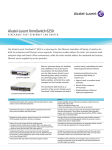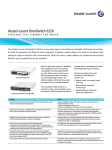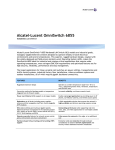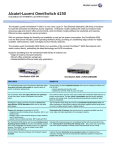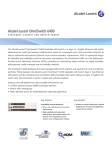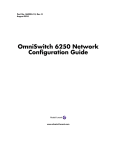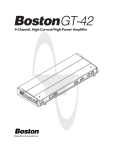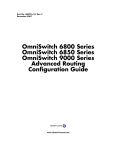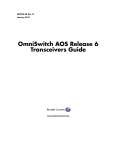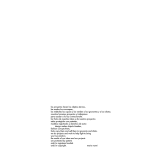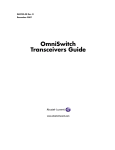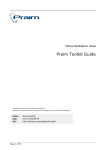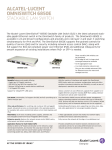Download Alcatel-Lucent OS6450-SW-ME
Transcript
ALCATEL-LUCENT OMNISWITCH 6450-10 GIGABIT ETHERNET LAN SWITCH The Alcatel-Lucent OmniSwitch™ 6450 Stackable Gigabit Ethernet LAN value switch family includes a series of 10-port models (non-PoE, Power over Ethernet [PoE], Fast and Gigabit Ethernet) for classroom, workgroup and small enterprise segments. Designed with an optimized size, low-power consumption, fan-less and fan models and a rich software feature set, the OmniSwitch 6450-10 models provide a highly available, self-protective, easily managed and eco-friendly collocation solution. OmniSwitch 6450-P10S Service providers offering managed services have the option to install the Metro services license enabling a set of Metro Ethernet features. This allows the OmniSwitch 6450-10 port models to be quickly integrated into the provider’s network as advanced customer premise equipment (CPE) devices. The OS6450P10S is especially designed for small cell access point deployments requiring higher PoE power and precision network timing. The Alcatel-Lucent OmniSwitch 6450-10 models use the latest technologies and Alcatel-Lucent Operating System (AOS) innovations. OmniSwitch 6450-10L/10 OmniSwitch 6450-P10L/P10 Solutions benefiting from the OmniSwitch 6450-10 switches are: • Classroom and workgroup networks • Small enterprise or branch office networks • Commercial and residential managed services • Service Provider networks deployments ALCATEL-LUCENT OMNISWITCH 6450-10 The Alcatel-Lucent OmniSwitch 645010 offers eight user ports for smaller network environments. These models are power and acoustically optimized, with a half-rack width (8.5 in./21.59 cm), and have a fixed configuration chassis in a 1 RU form factor. All models are fan-less (except –P10S) and have an internal power supply. The –P10L/-P10 PoE models are both IEEE 802.3af/802.3at compliant with a 115 W power budget for PoE attached devices. The P10S PoE model supports IEEE 802.3af/802.3at, and is compliant the PoE section of the PoH (Power over HDBase-T over four pair) standard with a 280W power budget for PoE attached devices. The OmniSwitch 6450-10L/P10L models have the user port speeds fixed for 10/100M operation. These models are upgradeable to gigabit speeds in the future using the OS6450-10L-UPGD license upgrade. Table 1. OmniSwitch 6450-10 model configurations CHASSIS 10/100 PORTS 10/100/ 1000 PORTS GIG COMBO PORTS SFP UPLINK (GIGABIT) SFP STACKING (5 GB/S)* POWER SUPPLY SUPPORTED BACKUP POWER SUPPLY SUPPORTED Non-PoE models OS6450-10L 8 0 2 2 Internal AC N/A OS6450-10 0 8 2 2 Internal AC N/A PoE models OS6450-P10L 8 0 2 2 Internal AC N/A OS6450-P10 0 8 2 2 Internal AC N/A OS6450-P10S 0 8 0 2 Internal AC N/A Port information: • RJ-45 combo port configurable to be RJ10/100/1000Base-T • SFP combo port supporting 100/1000Base-X transceivers for short, long and very long distances • SFP fixed fiber interfaces support only gigabit SFP transceivers or SFP stacking cable. • All P10S ports support 1588v2 Transparent Clock and is a non-stackable switch TECHNICAL SPECIFICATIONS PORT OS6450-10L OS6450-10 OS6450-P10L OS6450-P10 OS6450-P10S* RJ-45 10/100 ports 8 0 8 0 0 RJ-45 10/100/1000 ports 0 8 0 8 8 RJ-45/SFP 10/100/1000 combo ports 2 2 2 2 0 SFP uplink/stacking ports 2 2 2 2 2 PoE ports 0 0 8 8 8 Maximum units stackable* 4 4 4 4 N/A Switch width 8.50 in. (21.5 cm) 8.50 in. (21.5 cm) 8.50 in. (21.5 cm) 8.50 in. (21.5 cm) 8.50 in. (21.5 cm) Switch height 1.73 in. (4.4 cm) 1.73 in. (4.4 cm) 1.73 in. (4.4 cm) 1.73 in. (4.4 cm) 1.73 in. (4.4 cm) Switch depth 11.5 in. (29.21 cm) 11.5 in. (29.21 cm) 11.5 in. (29.21 cm) 11.5 in. (29.21 cm) 11.5 in. (29.21 cm) Switch capacity (with 2GigE uplinks) 5.6 Gb/s 20 Gb/s 5.6 Gb/s 20 Gb/s 20 Gb/s Switch capacity (with 4GigE uplinks) 9.6 Gb/s 24 Gb/s 9.6 Gb/s 24 Gb/s N/A Max frame rate (4GigE or 2GigE uplinks) 14.28 Mp/s 35.70 Mp/s 14.28 Mp/s 35.70 Mp/s 29.76 Mp/s (2 uplinks) Stacking capacity (2x5Gbs stacking) 10/20 Gb/s 10/20 Gb/s 10/20 Gb/s 10/20 Gb/s Operating temperature 0°C to +45°C 32°F to +113°F 0°C to +45°C 32°F to +113°F 0°C to +45°C 32°F to +113°F 0°C to +45°C 32°F to +113°F 0°C to +45°C 32°F to +113°F Storage temperature -40°C to +75°C -40°F to +167°F -40°C to +75°C -40°F to +167°F -40°C to +75°C -40°F to +167°F -40°C to +75°C -40°F to +167°F -40°C to +75°C -40°F to +167°F Humidity (operating and storage) 5% to 95% 5% to 95% 5% to 95% 5% to 95% 5% to 95% MTBF (hours) 695,192 695,192 499,729 499,729 329,729 Power supply efficiency 85.6% 85.6% 90.1% 90.1% 88.46% Fan-less design (Yes/No) Yes Yes Yes Yes No (1+1 redundant) Acoustic (dB) Silent Silent Silent Silent <40 db(A) System power consumption (watts/btu)** • 0% traffic • 50% traffic • 100% traffic 12.40W / 42.31 12.70W / 43.33 12.70W / 43.33 13.00W / 44.35 15.00W / 51.18 15.2W / 51.86 12.90W / 44.01 13.61W / 46.43 13.65W / 46.57 14.20W / 48.45 16.30W / 55.61 16.35W / 55.78 20.20W / 68.92 22.25W / 75.92 23.80W / 81.20 PoE power budget N/A N/A 115 W 115 W 280 W Dimensions Performance (Aggregated) N/A Operating conditions Alcatel-Lucent OmniSwitch 6450-10 ALCATEL-LUCENT ENTERPRISE DATA SHEET 2 PORT OS6450-10L OS6450-10 OS6450-P10L OS6450-P10 OS6450-P10S* Max PoE power/port (up to the power budget) N/A N/A 31W 31W Ports 1-4: 75W (four pair) N/A N/A 409 409 921 Ports 5-8: 31W (two pair) PoE device heat dissipation (btu) * All PoE ports support IEEE 802.3af/802.3at. PoE (four pair) ports 1-4 are compliant with the PoE portion of the Power over HD Base-T (PoH) standard with a 280W PoE power budget. ** Power consumption measured with 64 byte packets at varied % traffic conditions on all port, including the stacking ports Indicators System LEDs • System (OK) (chassis HW/SW status) • PWR (primary power supply status) Safety agency certifications • CB Scheme: Certification per IEC 60950/ EN 60950 with all different country deviations, IEC 60950-1:2005: 2nd Edition • PRI (virtual chassis primary) ¬UL 60950 United States • BPS (backup power status) ¬IEC 60950-1:2006; all national deviations • STK (stacking indicator for 10 port models) Per-port LEDs • 10/100/1000: PoE, link/activity • SFP: Link/activity • Stacking: Link/activity Compliance and certifications Commercial EMI/EMC • FCC CRF Title 47 Subpart B (Class A limits. Note: Class A with UTP cables) • VCCI (Class A limits. Note: Class A with UTP cables) • AS/NZS 3548 (Class A limits. Note: Class A with UTP cables) ¬EN 60950-1: 2nd Edition+A11: 2009+A1: 2010+A12: 2011 (Electric/ Health & Safety) all national deviations ¬CAN/CSA-C22.2 No. 60950-1-03 ¬NOM-019 SCFI, Mexico ¬AS/NZ TS-001 and 60950:2000, Australia ¬UL-AR, Argentina ¬UL-GS Mark, Germany • IEC 60825-1 Laser, IEC 60825-2 Laser • CDRH Laser • EN 61000-3-3: 2008 • EN 61000-3-2: 2006+A1:2009+A2 (Limits for harmonic current emissions) • EN 55024: 2010 (ITE Immunity characteristics) ¬EN 61000-4-2: 2008 ¬EN 61000-4-3: 2010 ¬EN 61000-4-4: 2011 ¬EN 61000-4-5: 2005 ¬EN 61000-4-6: 2008 ¬EN 61000-4-8: 2009 ¬EN 61000-4-11: 2004 • IEEE802.3: Hi-Pot Test (2250 V DC on all Ethernet ports) • EN 50581: 2012 Standard for technical documentation for RoHS recast Alcatel-Lucent OmniSwitch 6450-10 ALCATEL-LUCENT ENTERPRISE DATA SHEET 3 • Port monitoring feature that allows capture of Ethernet packets to a file, or for on-screen display to assist in troubleshooting • sFlow v5 and RMON: For advanced monitoring and reporting capabilities Simplified management • Digital Diagnostic Monitoring (DDM): Real-time diagnostics of fiber connections for early detection of optical signal deterioration Configuration management interfaces • Easy-to-use, point-and-click web-based element manager (WebView) with built-in help for easy configuration • EN 55022: 2010 (EMI and EMC requirement)) • Remote port mirroring that facilitates passing mirrored traffic through the network to a remotely connected device • IP tools: Ping and trace route •CE-Mark ¬2011/65/EU: RoHS-Directive • Policy-based mirroring – allows selection of the type of traffic to mirror by using quality of service (QoS) policies for statistics, history, alarms, and events • Intuitive Alcatel-Lucent command-line interface (CLI) with familiar interface reducing training costs ¬2004/108/EC: EMC-Directive • Port-based mirroring for troubleshooting and lawful interception supporting four sessions with multiple sources-to-one destination DETAILED PRODUCT FETAURES • CE-Mark: Marking for European countries (Class A limits. Note: Class A with UTP cables) ¬2006/95/EC: Low voltage Directive Monitoring and troubleshooting • Local (on the flash) and remote server logging: Syslog and command log • Integration with Alcatel-Lucent OmniVista for network management • Full configuration and reporting using SNMPv1/2/3 across all OmniSwitch families to facilitate third-party Network Management System (NMS) integration • Remote Telnet management or Secure Shell access using SSHv2 • File upload using USB, TFTP, FTP, SFTP, or SCP for faster configuration • Human-readable ASCII-based configuration files for offline editing and bulk configuration • Managed by Alcatel-Lucent 5620 Service Aware Manager • Time Domain Reflectometry (TDR): For locating breaks or other discontinuity in copper cables Network configuration • Auto remote configuration download feature • Auto-negotiating 10/100/1000 ports automatically configure port speed and duplex setting • Auto MDI/MDIX automatically configures transmit and receive signals to support straight through and crossover cabling • BootP/Dynamic Host Configuration Protocol (DHCP) client allows auto-config of switch IP information for simplified deployment • DHCP relay to forward client requests to a DHCP server • Alcatel-Lucent Mapping Adjacency Protocol (AMAP) for building topology maps • IEEE 802.1AB Link Layer Discovery Protocol (LLDP) with MED extensions for automated device discovery • Multiple VLAN Registration Protocol (MVRP) for IEEE 802.1Q-compliant. VLAN pruning and dynamic VLAN creation • Auto QoS for switch management traffic as well as traffic from Alcatel-Lucent IP phones • IEEE 1588v2 Precision Timing Protocol (PTP) via end-to-end Transparent Clock (TC) for network-wide time synchronized applications: – “S” models only • Network Time Protocol (NTP) for networkwide time synchronization • Stackable to 4 units Resiliency and high availability • Rapid Ring Spanning Tree Protocol (RRSTP) optimized for ring topology to provide less than 100 ms convergence time • IEEE 802.1s Multiple Spanning Tree Protocol: Encompasses IEEE 802.1D STP and IEEE 802.1w Rapid Spanning Tree Protocol • Per-VLAN spanning tree (PVST) and Alcatel-Lucent 1x1 STP mode • IEEE 802.3ad Link Aggregation Control Protocol (LACP) and static LAG groups across modules is supported • Dual-home link (DHL) support for sub second link protection without STP • Virtual Router Redundancy Protocol (VRRP) to provide highly available routed environments • Broadcast and multicast storm control to avoid degradation in overall system performance • Unidirectional Link Detection (UDLD): Detects and disables unidirectional links on fiber optic interfaces • Layer 2 port loopback detection for preventing customer loops on Ethernet access ports • Redundant and hot-swappable power supplies, transceivers modules offering uninterruptable service • Dual image and dual configuration files storage provides backup Advanced security Access control • AOS Access Guardian framework for comprehensive user policy- based Network Access Control (NAC) • Autosensing 802.1X multi-client, multi-VLAN • MAC-based authentication for non-802.1x hosts Alcatel-Lucent OmniSwitch 6450-10 ALCATEL-LUCENT ENTERPRISE DATA SHEET 4 • Web-based authentication (Captive Portal) – a customizable web portal residing on the switch that can be used for authenticating supplicants as well as non-supplicants • Group mobility rules and “guest” VLAN support • The host integrity check (HIC) agent on each switch makes it a HIC enforcer and facilitates endpoint device control for company policy compliance. • Supports dynamic Change of Authentication (CoA) and enforces traffic remediation or restriction for noncompliant devices. • User Network Profile (UNP) – simplify NAC management and control by dynamically providing pre-defined policy configuration to authenticated clients — VLAN, ACL, BW, HIC • SSH for secure CLI session with public key infrastructure (PKI) support • Centralized RADIUS and Lightweight Directory Access Protocol (LDAP) user authentication • Private VLAN feature for user traffic segregation Containment, monitoring and quarantine • Alcatel-Lucent Quarantine Manager and quarantine VLAN (not supported) • Learned Port Security (LPS) or MAC address lockdown – secures the network access on user or trunk ports based on MAC address • DHCP Snooping, DHCP IP Spoof protection • TACACS+ client allows for authentication authorization and accounting with a remote TACACS+ server • Dynamic Address Resolution Protocol (ARP) protection and ARP poisoning detection • Access control lists to filter out unwanted traffic including denial of service attacks; flow-based filtering in hardware (L1-L4) • Bridge Protocol Data Unit (BPDU) blocking – automatically shuts down user ports if a STP BPDU packet is seen to prevent topology loops • STP Root Guard – prevents edge devices from becoming Spanning Tree Protocol root node • The P10S PoE model supports IEEE 802.3af, IEEE 802.3at and is compliant the PoE section of the PoH (Power over HDBase-T) standard • Configurable per port PoE priority and max power for power allocation • Dynamic PoE allocation delivers only the power needed by the Powered Devices (PD) up to the total power budget for most efficient power consumption. QoS • Priority queues: Eight hardware-based queues per port for flexible QoS management • Traffic prioritization: Flow-based QoS with internal and external (that is, remarking) prioritization • Bandwidth management: Flow-based bandwidth management, ingress rate limiting; egress rate shaping per port • Queue management: Configurable scheduling algorithm – Strict Priority (SQP), Weighted Round Robin (WRR) and Deficit Round Robin (DRR) • Congestion avoidance: Support for Endto-End Head of Line (E2E-HOL) Blocking Protection • Auto QoS for switch management traffic as well as traffic from Alcatel-Lucent IP phones • Three color marker – single/dual rate – policing with commit BW, excess BW, burst size Layer 2, Layer 3 routing and multicast Layer 2 switching • Up to 16,000 MACs • Up to 4000 VLANs • Up to 2K Access Control Lists (ACLs) • Latency: <4 µs IPv4 and IPv6 • Static routing for IPv4 and IPv6 • RIP v1 and v2 for IPv4, RIPng for IPv6 • Up to 256 IPv4/128 IPv6 static and RIP routes • Up to 128 IPv4 and 16 IPv6 interfaces • Up to 1k Arp entries Multicast Converged networks PoE • The PoE models support Alcatel-Lucent IP phones and WLAN access points, as well as any IEEE 802.3af or IEEE 802.3at compliant end device. • IGMPv1/v2/v3 snooping to optimize multicast traffic • Multicast Listener Discovery (MLD) v1/v2 snooping • Up to 1000 multicast groups/stack • IP Multicast VLAN (IPMVLAN) for optimized multicast replication at the edge saving network core resources Network protocols • DHCP relay (including generic UDP relay) •ARP • DHCP relay • DHCP relay to forward client requests to a DHCP server • Generic User Datagram Protocol (UDP) relay per VLAN • DHCP Option 82 – configurable relay agent information Metro Ethernet access (features available through Metro license upgrade) • Ethernet services support per IEEE 802.1ad Provider Bridge • MAC-forced forwarding support according to RFC 4562 • L2CP – Layer 2 Control Protocol for tunneling a customer’s L2CP frames, using a well known address, on a given UNI for the EPL and EVPL services • RFC 2292/2373/2374/2460/2462 • Managed by Alcatel-Lucent 5620 Service Aware Manager • RFC 2461 NDP Supported standards IEEE standards • IEEE 802.1D (STP) • IEEE 802.1p (CoS) • IEEE 802.1ag (Connectivity Fault Management) ¬Service Access Point (SAP) profile identification • IEEE 802.1w (RSTP) • IEEE 802.1ad (Provider Bridge) • Q-in-Q (VLAN stacking) • IEEE 802.1s (MSTP) • IEEE 802.1X (Port-based Network Access Protocol) • IEEE 802.3i (10Base-T) • IEEE 802.3u (Fast Ethernet) • Ethernet OAM compliant with IEEE 802.3ah • IEEE 802.3x (Flow Control) • ITU-T G.8032 Ethernet Ring Protection designed for loop protection and fast convergence times (sub 50 ms) in ring topologies • IEEE 802.3ab (1000Base-T) • Service Assurance Agent (SAA) for proactively measuring network health, reliability and performance. Four SAA tests including L2-MAC, IP, ETH-LB and ETH-DMM depending on your network requirements • Customer Provider Edge (CPE) test head traffic generator and analyzer tool used in the metro Ethernet network to validate customer Service Level Agreements (SLA) • IPMVLAN for optimized multicast replication at the edge saving network core resources • Layer 2 Multicast VLAN Replication (MVR) – allows users from different multicast VLANs to subscribe to a multicast group from an upstream trunk interface • Three color marker – single/dual rate – policing with commit BW, excess BW, burst size • TR-101 Point-to-Point Protocol over Ethernet (PPPoE) Intermediate Agent allowing for the PPPoE network access method Alcatel-Lucent OmniSwitch 6450-10 ALCATEL-LUCENT ENTERPRISE DATA SHEET 5 • RFC 3376 IGMPv3 for IPv6 • Metro Ethernet Forum CE 2.0 Certified ¬Ethernet network-to-network interface (NNI) and user network interface (UNI) services • Private VLAN feature for user traffic segregation • RFC 2365 Multicast • RFC 1886 DNS for IPv6 • IEEE 802.1Q (VLANs) • IEEE 802.1ag Ethernet OAM: Connectivity Fault Management (L2 ping and link trace ) • RFC 2236/2933 IGMP v2 and MIB • Dying Gasp using SNMP and Ethernet OAM delivery ¬Transparent LAN Services with Service VLAN (SVLAN) and Customer VLAN (CVLAN) concept ¬CVLAN to SVLAN translation and mapping IP Multicast • RFC 1112 IGMP v1 • IEEE 802.3z (Gigabit Ethernet) • IEEE 802.3ac (VLAN Tagging) • IEEE 802.3ad (Link Aggregation) • IEEE 802.3af (Power over Ethernet) • IEEE 802.3at (Power over Ethernet) • IEEE 802.ah (Ethernet first mile) • IEEE 1588v2 Precision Timing Protocol (PTP) “S” models only ¬End-to-end Transparent Clock (TC) ¬IPv4 Unicast address or Ethernet Multicast Encapsulation ITU-T standards • ITU-T G.8032: Draft (June 2007) Ethernet Ring Protection • ITU-T Y.1731 OA&M fault and performance management IPv6 • RFC 2463/2466 ICMP v6 and MIB • RFC 2452/2454 IPv6 TCP/UDP MIB • RFC 2464/2553/2893/3493/3513 • RFC 3056 IPv6 Tunneling • RFC 3542/3587 IPv6 • RFC 4007 IPv6 Scoped Address Architecture • RFC 4193 Unique Local IPv6 Unicast Addresses Manageability • RFC 1350 TFTP Protocol • RFC 854/855 Telnet and Telnet options • RFC 1155/2578-2580 SMI v1 and SMI v2 • RFC 1157/2271 SNMP • RFC 1212/2737 MIB and MIB-II • RFC 1213/2011-2013 SNMP v2 MIB • RFC 1215 Convention for SNMP Traps • RFC 1573/2233/2863 Private Interface MIB • RFC 1643/2665 Ethernet MIB • RFC 1901-1908/3416-3418 SNMP v2c • RFC 2096 IP MIB • RFC 2570-2576/3411-3415 SNMP v3 • RFC 3414 User-based security model • RFC 2616/2854 HTTP and HTML • RFC 2667 IP Tunneling MIB • RFC 2668/3636 IEEE 802.3 MAU MIB • RFC 2674 VLAN MIB • RFC 4251 Secure Shell Protocol architecture • RFC 4252 The Secure Shell (SSH) Authentication Protocol • RFC 959/2640 FTP Security • RFC 1321 MD5 • RFC 2104 HMAC Message Authentication IETF standards RIP • RFC 1058 RIP v1 • RFC 1722/1723/1724/2453 RIP v2 and MIB • RFC 2138/2865/2868/3575/2618 RADIUS Authentication and Client MIB • RFC 2139/2866/2867/2620 RADIUS Accounting and Client MIB • RFC 2228 step • RFC 1812/2644 IPv4 Router Requirement • RFC 2284 PPP EAP • RFC 2080 RIPng for IPv6 • RFC 2869/3579 Radius Extension • RFC 768 UDP • RFC 1305/2030 NTP v3 and Simple NTP • RFC 896 Congestion control • RFC 793/1156 TCP/IP and MIB • RFC 1493 Bridge MIB • RFC 1122 Internet Hosts • RFC 826/903 ARP and Reverse ARP • RFC 1518/1519 CIDR • RFC 2474/2475/2597/3168/3246 DiffServ • RFC 919/922 Broadcasting Internet datagram • RFC 1541/1542/2131/3396/3442 DHCP • RFC 3635 Pause Control • RFC 925/1027 Multi LAN ARP/Proxy ARP • RFC 2697 srTCM • RFC 2131/3046 DHCP/BootP Relay • RFC 950 Sub-netting • RFC 2698 trTCM • RFC 2132 DHCP Options • RFC 951 BootP • RFC 2251 LDAP v3 • RFC 1151 RDP • RFC 3060 Policy Core • RFC 1191 Path MTU Discovery • RFC 3176 sFlow • RFC 1256 ICMP Router Discovery • RFC 3021 Using 31-bit prefixes Quality of service Others • RFC 791/894/1024/1349 IP and IP/Ethernet • RFC 792 ICMP • RFC 1757/2819 RMON and MIB OMNISWITCH 6450-10 MODELS ORDERING PART NUMBER DESCRIPTION OS6450-10L Fast Ethernet chassis in a 1 RU form factor with eight 10/100Base-T, two 10/100/1000 RJ-45/SFP combo and two fixed SFP uplink/stacking ports OS6450-10 Gigabit Ethernet chassis in a 1 RU form factor with eight 10/100/1000Base-T, two 10/100/1000 RJ-45/SFP combo and two fixed SFP uplink/stacking ports OS6450-P10L Fast Ethernet chassis in a 1 RU form factor with eight PoE 10/100Base-T, two 10/100/1000 RJ-45/SFP combo and two fixed SFP uplink/stacking ports OS6450-P10 Gigabit Ethernet chassis in a 1 RU form factor with eight PoE 10/100/1000Base-T, two 10/100/1000 RJ-45/SFP combo and two fixed SFP uplink/stacking ports OS6450-P10S Gigabit Ethernet chassis in a 1 RU form factor with eight PoE 10/100/1000Base-T and two fixed gigabit SFP uplink ports. Supports IEEE 802.3af, IEEE 802.3at and 4x75W PoE (four pair) ports compliant with the Power over HD Base-T (PoH) standard with a 280W PoE power budget. Supports 1588v2 precision timing protocol. License options All models above support the below license options. OS6450-10L-UPGD Software license enabling gigabit speeds on the RJ-45 ports of OS6450-10L and OS6450-P10L chassis to operate at gigabit speed OS6450-SW-ME OS6450 software license enables the Metro software features outlined in the Metro Ethernet access section of this data sheet. Mounting options Order optional 19” rack mounting kit separately OS6450-RM-19-L Simple L-bracket for mounting a single OS6450-10 model switch in a 19-in. rack OS6450-DUAL-MNT Two universal mounting and sliding brackets accessory kit. Hardware to mount two 6450-10 units in a 19-in. rack Gigabit transceivers SFP-GIG-LH70 1000Base-LH transceiver with an LC interface for single mode fiber over 1550 nm wavelength. Typical reach of 70 km SFP-GIG-LH40 1000Base-LH transceiver with an LC interface for single mode fiber over 1310 nm wavelength. Typical reach of 40 km SFP-GIG-LX 1000Base-LX transceiver with an LC interface for single mode fiber over 1310 nm wavelength. Typical reach of 10 km SFP-GIG-SX 1000Base-SX transceiver with an LC interface for multimode fiber over 850 nm wavelength. Typical reach of 300 m SFP-GIG-BX-D 1000Base-BX bidirectional transceiver with an LC type interface for use over single mode fiber optic on a single strand link up to 10 km point to point. Transmits 1490 nm and receives 1310 nm optical signal SFP-GIG-BX-U 1000Base-BX bidirectional transceiver with an LC type interface for use over single mode fiber optic on a single strand link up to 10 km point to point. Transmits 1310 nm and receives 1490 nm optical signal 100 Megabit transceivers SFP-100-MM 100Base-FX transceiver with an LC interface for multimode fiber optic cable SFP-100-SM15 100Base-FX transceiver with an LC type interface for single mode fiber optic cable up to 15 km SFP-100-SM40 100Base-FX transceiver with an LC type interface for single mode fiber optic cable up to 40 km SFP-100-BX-U 100Base-BX bidirectional transceiver with an SC type interface for use over single mode fiber optic on a single strand link up to 20 km point to point, where the client (ONU) transmits 1310 nm and receives 1550 nm optical signal SFP-100-BX-D 100Base-BX bidirectional transceiver with an SC type interface for use over single mode fiber optic on a single strand link up to 20 km point to point, where the client (OLT) transmits 1550 nm and receives 1310 nm optical signal enterprise.alcatel-lucent.com Alcatel, Lucent, Alcatel-Lucent and the Alcatel-Lucent logo are trademarks of Alcatel-Lucent. All other trademarks are the property of their respective owners. The information presented is subject to change without notice. Alcatel-Lucent assumes no responsibility for inaccuracies contained herein. Copyright © 2014 Alcatel-Lucent. All rights reserved. 20141110004EN (November)






